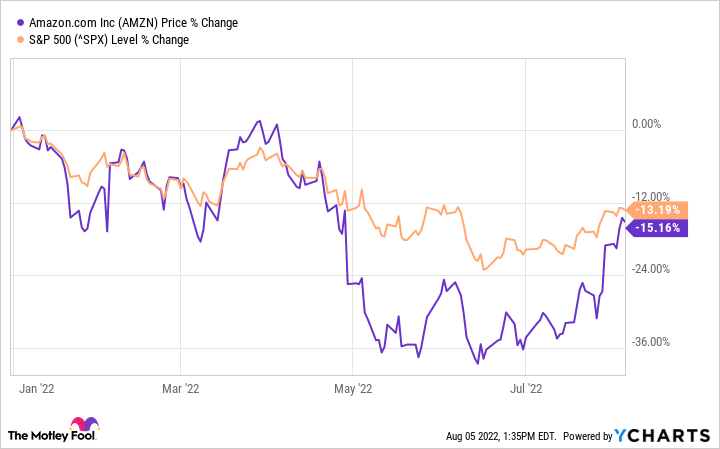Stock splits do not fundamentally change a corporation's value, but they have certain advantages. They can generate increased interest in a company -- which often translates to short-term stock price gains -- and allow investors the ability to afford single shares at a lower price tag. Still, a business's long-term prospects are more important than this piece of corporate engineering.
And among all the big-name companies that have conducted stock splits this year, one stands out as the most attractive of the bunch, in my view. That company is none other than Amazon (AMZN 3.43%), which executed a 20-for-1 stock split on June 6. Let's see why the tech giant remains a solid pick even with a market cap above $1 trillion.
Amazon's cloud business is crushing near-term issues
With inflation leading to higher fuel and trucking costs, it's almost impossible for a company such as Amazon not to be negatively impacted. That's on top of other economic problems, such as labor shortages. Overall, Amazon handled these challenges reasonably well during the second quarter. The tech giant reported a net loss of $2 billion, but that was mainly due to a $3.9 billion non-operating expense related to its stake in electric vehicle (EV) company Rivian Automotive.
The company reported a net income of $7.8 billion in the comparable period of the previous fiscal year. Amazon is implementing ways to control and manage increased costs due to external factors, including improving the efficiency of its fulfillment network. These initiatives seem to have worked, at least according to management. On the top line, Amazon's net sales increased by 7% year over year to $121.2 billion. The company's North America segment increased its revenue by about 10%, while its international unit saw a 12% drop in sales.
Once again, Amazon's cloud business was the star of the show. Sales from Amazon Web Services (AWS) clocked in at $19.7 billion, 33% higher than the year-ago period. Furthermore, while the e-commerce specialist's other two businesses reported operating losses, AWS' operating income jumped by about 36% to $5.7 billion. AWS is, by itself, practically a whole Fortune 500 company that generates substantial profits and solid margins. Amazon sees plenty of growth opportunities here.
Says CEO Andy Jassy: "AWS continues to grow at a fast pace, and we believe we're still in the early stages of enterprise and public sector adoption of the cloud." If Jassy is correct that we're in the early innings of the growth of the cloud business, this is an opportunity Amazon could continue to tap into for well over a decade. And considering how well it is performing even amid macroeconomic headwinds, imagine what things will look like when economic growth gets back in the right direction, customers start spending more, and businesses look for ways to increase efficiency and productivity.
All of these will work in Amazon's favor.
A solid moat and additional opportunities
The e-commerce industry is competitive, as is the cloud business. Amazon can remain a leader in both because it has the means to invest in expansion initiatives. Also, the company has managed to build a solid competitive advantage from multiple sources. For instance, Amazon benefits from a strong brand name -- an intangible asset. According to Statista, Amazon is the second-most valuable brand in the world. There is also the company's e-commerce flywheel effect.
Its network of merchants is so broad that it continues to attract customers, and the more people shop on Amazon's platform, the more it attracts additional merchants. Also, AWS arguably benefits from high switching costs. Businesses rely on the tech giant's cloud solutions in their day-to-day operations, and seeking to switch providers could lead to business disruptions. There is room for multiple winners in every major industry in which Amazon competes. The company's moat ensures that it will remain a leader and will be one of these winners in the long run.
Lastly, Amazon is looking to exploit other potential growth opportunities. In late July, Amazon announced it would acquire tech-centric healthcare company One Medical in an all-cash transaction valued at $3.9 billion. One Medical provides primary care services with both virtual and in-person options. Amazon's acquisition of One Medical perhaps signals an increased desire to pour funding and investment into the lucrative healthcare sector, efforts that could pay rich dividends down the road.
It's not too late to buy Amazon stock
Amazon has already delivered significantly above-average returns in the past 20 years. But the next few decades could also be excellent for the company and its shareholders. Its e-commerce business is feeling the effects of economic headwinds, but overall, it is handling them pretty well. Its cloud unit is firing on all cylinders and has a long runway for growth.
On top of it all, Amazon has a strong competitive advantage and is looking to expand its empire. The company checks nearly all the boxes that signal exciting prospects ahead. Don't let the market's heightened volatility scare you away from this winning stock.






